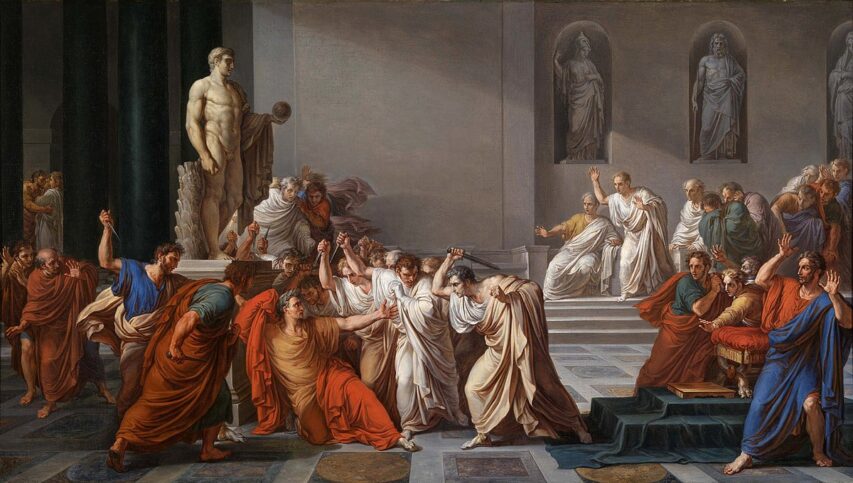Rob Henderson considers the character of Julius Caesar (as filtered through Plutach and Shakespeare), and the “Dominance-Oriented Status Seekers” identified in a recent paper:

La morte di Cesare (The death of Caesar)
Oil painting by Vincenzo Camuccini between 1804 and 1805. via Wikimedia Commons.
In the opening scene of Shakespeare’s Julius Caesar (which is drawn from Plutarch’s Lives), the commoners of Rome are seen celebrating Caesar’s recent triumph over Pompey.
Two tribunes (elected officials), Flavius and Marullus, accost two of the commoners, asking them to name their trades and explain why they are out in their best attire rather than working.
The commoners respond to the tribunes’ condescension with indirect answers and puns that annoy the tribunes even more.
Eventually, Flavius and Marullus learn that the plebeians are cheering Caesar. The tribunes scorn them for doing this.
They tell the commoners that Pompey was a Roman too. So Caesar’s success was not truly a triumph for Rome.
Flavius later tells Marullus that they should remove the decorations from Caesar’s statues during Caesar’s parade.
Marullus questions this plan, stating that it also happens to be the Feast of Lupercal, a celebration of fertility.
But Flavius is adamant that they remove the ornaments, because the removal will help prevent Caesar from seeing himself as too great.
This first scene of Julius Caesar shows that the tribunes want to prevent the rise of a potential tyrant. But they themselves are more than willing to push the commoners around.
Later, two other prominent Romans — Brutus and Cassius — are likewise shown expressing their concerns about Caesar’s growing popularity.
Cassius asks Brutus how Caesar has any more right to greatness than Brutus or himself.
Cassius tells Brutus a story: When they were young, Cassius saved young Julius Caesar from drowning. Cassius always viewed himself as superior for rescuing Caesar. He is now aggravated that Caesar has risen above him.
Cassius decides to orchestrate Caesar’s assassination. Cassius gradually convinces other members of the Roman elite to help him carry out the conspiracy.
Meanwhile, Caesar himself, speaking privately with Mark Antony, expresses suspicions about Cassius:
CAESAR
Let me have men about me that are fat,
Sleek-headed men, and such as sleep a-nights.
Yond Cassius has a lean and hungry look.
He thinks too much. Such men are dangerous.
ANTONY
Fear him not, Caesar; he’s not dangerous.
He is a noble Roman, and well given.
CAESAR
Would he were fatter! But I fear him not.
Yet if my name were liable to fear,
I do not know the man I should avoid
So soon as that spare Cassius. He reads much,
He is a great observer, and he looks
Quite through the deeds of men. He loves no plays,
As thou dost, Antony; he hears no music;
Seldom he smiles, and smiles in such a sort
As if he mocked himself and scorned his spirit
That could be moved to smile at anything.
Such men as he be never at heart’s ease
Whiles they behold a greater than themselves,
And therefore are they very dangerous.
I rather tell thee what is to be feared
Than what I fear; for always I am Caesar.
Come on my right hand, for this ear is deaf,
And tell me truly what thou think’st of him.Caesar is saying all men are hungry, either for food, entertainment (“he loves no plays … he hears no music”), or power. If prosperous men aren’t tempted by food and entertainment, then they crave power. Thus, prosperous men who are lean are dangerous.
Mark Antony dismisses Caesar’s concerns about Cassius, because Cassius is a “noble Roman”. But as events unfold, we see that Antony was misguided.
Caesar was correct in his judgment of Cassius.
The eminent literary critic (and my former professor) Harold Bloom has stated that Caesar’s “estimate of Cassius shows him to be the best analyst of another human being in all of Shakespeare”.
Bloom goes on to characterize Cassius as embodying a “spirit of resentment, unhappy as he is at contemplating greatness beyond him”.
Cassius secretly arranges to have fake notes sent to Brutus, who is fooled into thinking the notes have been written by ordinary Roman citizens who want the Roman elites to stand up against Caesar.
When persuading the other conspirators to help him carry out the assassination plot, Cassius’s stresses his concern for the future of Rome.
But Cassius’s story to Brutus indicates that the assassination was in part fueled by his resentment that Caesar grew into someone more powerful than himself, thus upending their former status disparity.



